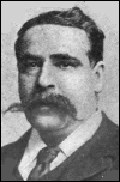Harry Quelch

Harry Quelch, the son of a blacksmith, was born in Hungerford, Berkshire, on 30th January, 1858. The Quelch's were very poor and at the age of ten Harry was forced to leave school to help increase the family income. Harry found work in an upholster's shop and this was followed by spells working for a dairyman and a cattle dealer.
At the age of fourteen, Quelch left Berkshire for London and successively worked as a factory worker producing biscuits, a tanyard, an iron foundry, and a wholesale paper warehouse. Although Quelch left school early he retained an interest in education and in his twenties he taught himself French.
Quelch read numerous books on politics including a French edition of Das Capital by Karl Marx. The book converted him to revolutionary socialism and after hearing H. M. Hyndman lecture on Marx in 1881, Quelch joined the Social Democratic Federation.
Quelch was elected to the executive of the SDF in 1883 and remained a loyal supporter of H. H. Hyndman when William Morris, Ernest Belfort Bax, Eleanor Marx and Edward Aveling left the party in 1884 to form the Socialist League. Quelch now became an increasing important member of the Social Democratic Federation and in 1886 he left his job in the warehouse and became the paid editor of the party's journal, Justice.
Along with H. H. Hyndman, John Burns and Robert Cunninghame Graham, Harry Quelch played an important role in organising the protest meeting on 13th February, 1887, in Trafalgar Square that led to the events that became known as Bloody Sunday.
Despite attempts by Ben Tillett and Tom Mann to keep the Social Democratic Federation away from the London Dockers' Strike in 1889, Quelch worked with Will Thorne on the South Side Strike Committee that organised strikers south of the Thames.
Quelch represented the Social Democratic Federation at the Trade Union Congress in the early 1890s. Quelch, who had also taught himself German as well as French, attended several conferences held by European socialist groups. He also regularly represented the SDF at the annual congress of the German Social Democratic Party.
On 27th February 1900, Quelch represented the Social Democratic Federation at the meeting in London that established a Labour Representation Committee (LRC). However, the following year Quelch led the campaign that resulted in the SDF withdrawing from the LRC. Despite his hostility to what he considered to be the non-socialist policies of the LRC, Quelch continued the attend their conferences as a delegate of the London Trades Council.
Quelch made several attempts to enter the House of Commons. In January 1902 he was the defeated SDF candidate at the Dewsbury by-election. In the 1906 General Election Quelch came bottom of the poll in Southampton. He was also badly defeated at Northampton in the 1910 General Election.
Quelch was a strong opponent of the idea of women's suffrage based on property qualifications. Quelch, like most socialists, favoured universal adult suffrage and when the WSPU agreed to a plan that would give the vote to women householders, he denounced the organisation as "anti-proletarian, anti-Socialist and anti-democratic.
In April 1913, ill-health forced Quelch to retire from his full-time post with Justice, the journal he had edited for twenty-seven years. However, Harry Quelch continued to write for the journal until his death on 17th September, 1913.
